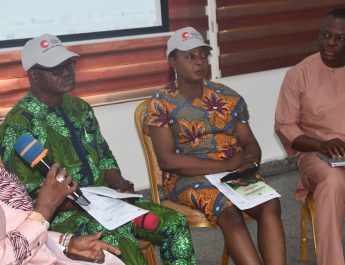In line with the United Nations Sustainable Development Goal (UNSDG) 17, which focuses on Partnerships for Goals, the Nigerian Maritime Administration and Safety Agency (NIMASA) consolidates on its collaboration with relevant stakeholders
In its bid to enhance the efficiency of Nigeria’s maritime sector, the Nigerian Maritime Administration and Safety Agency (NIMASA) has committed to further advancing its vision and mission by fostering collaboration and strengthening the sector for sustainable growth.
As the regulator of Nigeria’s maritime industry, NIMASA has taken significant steps to align its initiatives with the principles of UNSDG 17. Through its partnerships with international organizations, the private sector and local stakeholders, NIMASA aims to enhance the efficiency, safety and sustainability of the maritime sector while contributing to national and global sustainable development objectives.
A central focus of NIMASA’s the Nigerian Maritime Administration and Safety Agency, NIMASA initiatives revolves around the development of a robust and sustainable maritime sector that not only drives economic growth, but also ensures environmental protection and social inclusivity.
By working in close partnership with stakeholders such as the International Maritime Organization (IMO), the Nigerian government and private sector players, NIMASA seeks to create a conducive environment for the growth of maritime trade, job creation, and technological innovation.
As part of efforts toward sustaining the momentum of a safer maritime domain in Nigeria, Chief of Naval Staff (CNS), Vice Admiral Emmanuel Ogalla, paid a working visit to NIMASA Head Office in Lagos during which the importance of collaboration in actualizing the mandates of both the Nigerian Navy and the Agency was highlighted.
Ogalla, who acknowledged the efforts of NIMASA under the management of Dr. Dayo Mobereola for its implementation of national and international frameworks that bolster maritime safety and security, also reaffirmed the commitment of the Navy to supporting initiatives by NIMASA towards the realization of the mandate.
The aim is to ensure the attainment of a regime of sustainable security in Nigeria’s maritime domain, as Ogalla further canvassed the renewal of the Memorandum of Understanding (MoU) between the parties, which underscored the critical role of inter-agency collaboration in enhancing Nigeria’s maritime security and promoting economic growth.
In a related development, NIMASA and the National Drug Law Enforcement Agency (NDLEA) have intensified efforts to combat drug trafficking in the country’s seaports. This joint initiative is part of a broader strategy to enhance port security and curb the illegal trade of narcotics, which has been a significant challenge for Nigeria’s security and economic stability.
Speaking during a visit to NIMASA in Lagos, the Chairman and Chief Executive of the NDLEA Brigadier General Buba Marwa stressed the need for a stronger collaboration between the NDLEAs Marine Command and NIMASA, particularly through the Deep Blue Project aimed at strengthening maritime security in the country, to enhance the protection of Nigeria’s maritime space.
As part of the collaboration, the NDLEA pledged to sensitize staff members of NIMASA and cadets under the National Seafarers Development Programme (NSDP) on the dangers of drug abuse and how to mitigate the impact on the citizenry and the economy.
Similarly, the agencies agreed that NIMASA will also explore options to integrate NDLEA personnel into the existing maritime security architecture, particularly the Deep Blue Project to ensure that drug traffickers in the maritime sector are arrested and prosecuted.
The collaboration between NIMASA and NDLEA involves the deployment of advanced surveillance technologies, including the use of scanners, drones and other monitoring tools to detect and prevent the movement of illicit drugs through the seaports.
The agencies will also work together to strengthen intelligence-sharing systems, conduct thorough inspections of cargo, and improve the training of port security personnel to identify and seize illegal substances.
This move comes as part of Nigeria’s broader efforts to meet international standards for maritime security and reduce the country’s involvement in global drug trafficking networks. The initiative also aims to safeguard the health and safety of the Nigerian population, ensuring that illicit drugs do not find their way into the market.
Imperatively, the partnership between NIMASA and NDLEA remains critical in the fight against drug trafficking, with both agencies emphasizing their commitment to eliminating illegal drug trade through the nation’s seaports.
Still on partnership, the Agency received a delegation from the United States Coast Guard (USCG) as part of efforts to deepen collaboration aimed at enhancing maritime security and operational standards between the two organisations.
The discussions focused on formulating a three-year plan to address and potentially lift the Condition of Entry (CoE) imposed on vessels departing Nigeria for the United States. This initiative underscores a mutual commitment to improving compliance with international maritime security standards.
Furthermore, in recognizing the importance of continuous professional development, the USCG also expressed readiness to assist NIMASA in training its personnel. A proposed gap analysis aims to identify specific training needs in ensuring that NIMASA employees are equipped with requisite skills in accordance to global best practices in maritime security.
Also, on the front burner is the plan by the USCG to conduct bi-annual assessments of Nigerian ports’ adherence to the International Ship and Port Facility Security (ISPS) Code in an evaluation procedure intended to provide actionable insights, facilitating updates to security protocols and contributing to the broader goal of lifting the CoE.
Similarly, Mobereola, during a courtesy visit by the Director General of the Infrastructure Concession Regulatory Commission (ICRC), Dr. Jobson Oseodion Ewalefoh, asserted that adopting the Public Private Partnership (PPP) model is essential for the infrastructure development of Nigeria’s maritime sector.
He also emphasized the importance of the Commission’s increased involvement in attracting private investors to develop infrastructural capacity in Nigeria’s maritime sector.
Furthermore, Mobereola, who disclosed the need to streamline processes through technology, commended the Management of the ICRC for being responsive, adding that due to the capital- intensive nature of the maritime sector, government alone could not fund the sector, considering the required infrastructure.
He charged the ICRC to help in the development of a PPP based business models that will be attractive to the private sector both from within and outside the country.
On his part, the ICRC DG corroborated NIMASA’s stance and underscored the significance of the maritime sector to Nigeria’s economy, noting that the PPP model would facilitate increased funding and expertise from the private sector, thereby accelerating the growth and development of the Nigerian maritime sector.
“There is no time to waste our country needs lots of funding for infrastructure, and we need to create an enabling environment for activities to thrive. First, is service delivery, not revenue generation, and people will be willing to pay if they get the right services.
“The PPP model has proven to be the most viable approach worldwide for driving government policies that promote development and economic growth, hence NIMASA has continued to rely on collaboration to achieve its mandate, while also developing the sector,” he stated.
Similarly, the Agency has entered into partnership with Denmark for enhanced maritime security. This collaboration focuses on improving the safety and security of Nigeria’s maritime domain, addressing key concerns such as piracy, illegal fishing, and other criminal activities in the region. Denmark, with its advanced maritime security technologies and expertise, will support NIMASA’s efforts in creating a safer and more secure maritime environment.
This partnership includes capacity-building programmes, joint operations to monitor and patrol the waters effectively, among other areas considered crucial given the strategic importance of Nigeria’s shipping routes in the Gulf of Guinea, a region that has been plagued by piracy and maritime crimes. Such international partnerships will help boost regional stability, protect maritime trade routes, and encourage economic growth in the maritime sector.
Linking with the UNSDG, one of the key areas where NIMASA’s collaboration aligns with UNSDG 17 is in fostering capacity-building and knowledge exchange. The agency has facilitated numerous training programs, workshops, and seminars aimed at improving the skills of maritime professionals, ensuring that the workforce is well-equipped to manage modern challenges in the maritime industry. By engaging with global maritime organizations, NIMASA helps Nigerian maritime professionals stay abreast of the latest international standards, regulations, and innovations.
Additionally, NIMASA’s emphasis on the protection of the maritime environment reflects another critical aspect of UNSDG 17. Sustainable maritime practices, such as the promotion of green shipping technologies and initiatives to combat maritime pollution, are key components of NIMASAs agenda. Collaborations with environmental organizations and international maritime bodies allow NIMASA to adopt best practices in environmental stewardship, which aligns with the broader goals of sustainability and climate action under UNSDG 13.
Furthermore, NIMASA’s role in strengthening Nigeria’s maritime infrastructure supports the countrys economic growth while promoting regional integration. By improving the country’s port facilities, expanding shipping routes, and modernizing the fleet, NIMASA is directly contributing to the achievement of UNSDG 9 (Industry, Innovation, and Infrastructure) by promoting resilient infrastructure and fostering innovation in the maritime sector.
Through these collaborations, NIMASA not only works to create a more efficient, secure and environmentally responsible maritime industry, but also enhances the sectors contribution to Nigeria’s economic diversification and sustainable development.
By aligning its goals with UNSDG 17, NIMASA demonstrates how effective partnerships can drive progress toward a more sustainable and equitable maritime future, benefiting both Nigeria and the global community.
In all, NIMASA’s collaboration initiatives serve as a model of how public and private sector partnerships, guided by the principles of UNSDG 17, can lead to a robust maritime sector. These efforts support economic development, environmental sustainability and social inclusion, which will ultimately help Nigeria and the global maritime industry move closer to achieving the United Nation’s broader sustainable development agenda.



